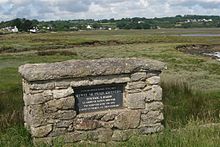Hywel from Owain
Hywel ab Owain († 1170 ) was a medieval Welsh ruler of Ceredigion , also known as a poet.
He was the oldest illegitimate son of Owain Gwynedd , King of Gwynedd , and his Irish lover Ffynod (also called Pyfog). His father gave him control of southern Ceredigion in 1139 , which led to an ongoing conflict with his uncle Cadwaladr ap Gruffydd , who ruled northern Ceredigion and Meirionydd. In 1143, Hywel was able to drive his uncle from Ceredigion on behalf of his father, but the two brothers reconciled in the following year and Cadwaladr got his possessions back. In 1145, Hywel and his half-brother Cynan launched an unsuccessful attack on Cardigan Castle , which was in the hands of the Anglo-Norman Lord Robert FitzStephen . Together with Cadell ap Gruffydd von Deheubarth , he conquered the castles of Carmarthen , Llansteffan and Wiston from the Anglo- Normans in 1146 . The next year he and Cynan conquered Meirionydd from his uncle Cadwaladr. After Cadwaladr handed over the rule of Ceredigion to his son Cadfan in 1149, Hywel besieged him in the castle of Llanrhystud. Hywel was able to conquer the castle and take Cadfan prisoner, but he could not hold the land against Cadell ap Gruffydd and his brother Rhys ap Gruffydd , who, as princes of Deheubarth, were the rightful rulers of Ceredigion and conquered it until 1153. After he had lost Ceredigion, Hwyel supported his father in 1157 at Basingwerk in the defense of the campaign of the English king Henry II. After his father had to submit to the English king, he supported an English force in 1159 in the fight against Rhys ap Gruffydd, who is now sole Had become ruler of Deheubarth. Little is known about his further life until 1170 after the death of Owain Gwynedd, wars of succession broke out between his sons. Hywel fell in the same year in the Battle of Pentraeth on the island of Anglesey in the fight against his half-brothers Dafydd and Rhodri from Owain . He was buried in Bangor Cathedral.
In addition to his military exploits, Hywel is best known as a poet. He was considered one of the most outstanding poets of his time, as he did not have to submit to any restrictions like the court bards, and composed love poems and songs of praise for the beauty of his homeland. Eight of his poems have survived.
Web links
- Arthur James Roderick: Hywel from Owain Gwynedd (d. 1170) , Welsh Biography Online, The National Library of Wales, [1] , accessed June 30, 2014
See also
| personal data | |
|---|---|
| SURNAME | Hywel from Owain |
| BRIEF DESCRIPTION | Welsh ruler of Ceredigion |
| DATE OF BIRTH | around 1120 |
| DATE OF DEATH | 1170 |
| Place of death | Pentraeth |
